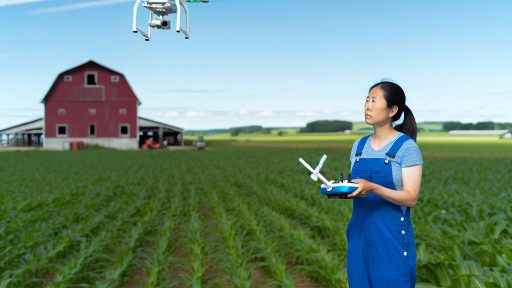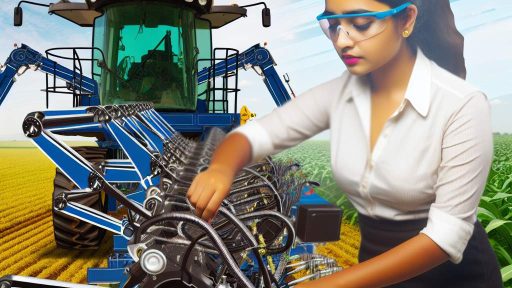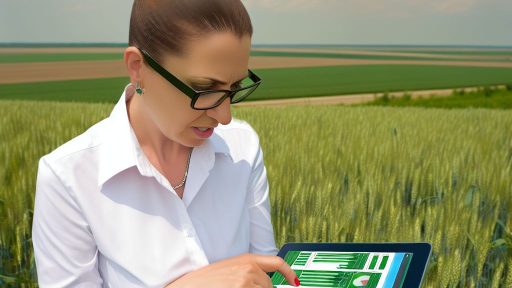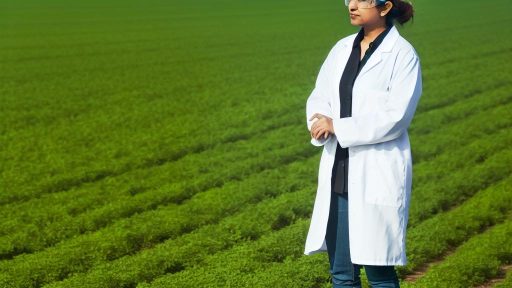Introduction to Autonomous Machinery in Farming
Technology plays a crucial role in modern agriculture.
Autonomous machinery revolutionizes traditional farming practices.
This shift enhances efficiency and productivity on farms.
Farmers increasingly adopt robotic systems and automated equipment.
These innovations reduce labor demands and costs significantly.
Understanding Autonomous Machinery
Autonomous machinery includes self-driving tractors and drones.
These machines operate with minimal human intervention.
They rely on advanced sensors and GPS technology.
As a result, precision farming experiences vast improvements.
The Benefits of Autonomous Machinery
- Improved efficiency leads to higher crop yields.
- Reduced need for manual labor decreases operating costs.
- Consistent monitoring helps manage crops more effectively.
Farmers notice increased accuracy in fieldwork and mapping.
Moreover, autonomous machinery minimizes the impact on the environment.
Challenges in Implementation
Despite the advantages, farmers face significant challenges.
Initial investment costs can be prohibitively high.
Furthermore, ongoing maintenance and technical support are necessary.
Additionally, there is a learning curve associated with new technologies.
Transform Your Agribusiness
Unlock your farm's potential with expert advice tailored to your needs. Get actionable steps that drive real results.
Get StartedFuture Trends in Autonomous Farming
The future of agriculture looks promising with continued innovation.
Emerging technologies will further enhance automation in farming.
For instance, artificial intelligence will enable smarter decision-making.
As a result, farms will operate with greater precision and sustainability.
Ultimately, autonomous machinery represents a pivotal shift in farming.
Overview of Different Types of Autonomous Machinery
Autonomous Tractors
Autonomous tractors represent a significant advancement in farming technology.
These machines operate without direct human intervention.
Farmers program routes using GPS, enabling efficient field navigation.
Moreover, they can perform tasks like plowing, planting, and harvesting.
This technology reduces labor costs and increases productivity.
Drones in Agriculture
Drones have transformed how farmers monitor their crops.
Equipped with cameras, they capture detailed aerial imagery.
This information allows farmers to assess crop health and growth conditions.
Additionally, drones can efficiently distribute fertilizers and pesticides.
Consequently, they help optimize resource usage and reduce waste.
Autonomous Robots for Weeding
Weeding robots offer a sustainable approach to crop management.
These robots identify and eliminate weeds without harming crops.
Using AI, they learn to distinguish between weeds and plants.
This targeted approach minimizes herbicide use and labor costs.
Farmers appreciate the efficiency and environmental benefits of these robots.
Automated Harvesters
Harvesters equipped with automation technology improve harvesting efficiency.
They analyze crop conditions to determine optimal harvesting times.
These machines operate with precision, reducing waste and damage.
Farmers can rely on automated harvesters for high-yield results.
Showcase Your Farming Business
Publish your professional farming services profile on our blog for a one-time fee of $200 and reach a dedicated audience of farmers and agribusiness owners.
Publish Your ProfileUltimately, this technology supports the economic viability of farms.
Precision Irrigation Systems
Precision irrigation systems optimize water use in agriculture.
These systems use sensors to monitor soil moisture levels.
This data informs irrigation schedules and amounts, conserving water.
Farmers can improve crop health while minimizing resource waste.
Such efficiency is critical in regions facing water scarcity challenges.
Benefits of Implementing Autonomous Machinery in Agriculture
Increased Efficiency
Autonomous machinery significantly enhances operational efficiency.
It performs tasks faster than traditional methods.
For example, drones can monitor crop health in real-time.
This leads to quicker decision-making and better outcomes.
Cost Reduction
Implementing autonomous systems reduces labor costs.
Fewer workers are needed for repetitive tasks.
Additionally, precision technology minimizes waste and improves resource use.
Over time, these savings accumulate, bolstering profit margins.
Improved Precision
Autonomous machinery operates with high precision.
This aspect is crucial for tasks like planting and fertilizer application.
Advanced sensors enable accurate measurements of soil and crop conditions.
Consequently, farmers achieve better yields and crop quality.
Enhanced Data Collection
Technological advancements facilitate data collection during farming operations.
Autonomous vehicles gather valuable information continuously.
This data can inform future farming decisions and strategies.
Moreover, it helps track performance and optimize resource allocation.
Environmental Benefits
Autonomous machinery contributes to sustainable farming practices.
It reduces the reliance on chemical applications through targeted treatment.
This decrease in chemicals supports healthier ecosystems.
Additionally, efficient resource management minimizes environmental footprints.
Increased Safety
Automation enhances safety in agricultural operations.
Autonomous machines can operate in hazardous conditions where humans cannot.
This capability reduces the risk of accidents and injuries.
Farmers can monitor these machines from safe locations.
Learn More: Integrating Controlled Environment Agriculture into Traditional Farming
Challenges and Limitations of Autonomous Farming Equipment
Technological Dependence
Farmers increasingly rely on advanced technology for operations.
This dependence creates vulnerabilities in agricultural processes.
Moreover, equipment failures can disrupt entire harvest seasons.
Similarly, software malfunctions may hinder efficiency and productivity.
High Initial Costs
Investing in autonomous machinery involves significant financial outlay.
Many farmers find it challenging to secure necessary funding.
Consequently, small farms may struggle to adopt new technologies.
In some cases, this can widen the gap between large and small producers.
Labor Market Implications
Autonomous machinery alters traditional labor dynamics in farming.
Showcase Your Farming Business
Publish your professional farming services profile on our blog for a one-time fee of $200 and reach a dedicated audience of farmers and agribusiness owners.
Publish Your ProfileAs machines take over manual tasks, job opportunities may decline.
Farmworkers may need to adapt to different roles or face unemployment.
Additionally, local economies could feel the effects of reduced labor demand.
Data Privacy and Security
The use of data-driven technologies raises privacy concerns.
Farmers must manage sensitive information about their operations.
Moreover, cybersecurity threats pose risks to agricultural data integrity.
A breach could lead to significant losses and operational disruptions.
Environmental Concerns
While autonomous machinery can increase efficiency, it also has ecological impacts.
For instance, over-reliance on technology may promote monocultures.
Such practices threaten biodiversity and soil health over time.
Furthermore, emissions from machinery can contribute to climate change.
Discover More: Troubleshooting Common Issues With Automated Machinery
Case Studies: Successful Implementation of Autonomous Technology
Introduction to Autonomous Technology in Farming
Autonomous technology transforms modern farming practices significantly.
This technology reduces labor costs while increasing efficiency.
Farmers worldwide are adopting these innovations steadily.
Case Study: AgriBot Innovations
AgriBot Innovations introduced autonomous tractors in 2022.
These tractors can operate without human intervention.
This allows farmers to manage larger fields effectively.
Significantly, they report a 30% increase in productivity.
Moreover, fuel consumption decreased substantially.
Key Features of AgriBot Tractors
- Remote control for field mapping.
- Highly accurate GPS technology.
- Automated seeding and fertilizing processes.
- Real-time monitoring of soil conditions.
Case Study: GreenTech Solutions
GreenTech Solutions launched drone technology in agriculture.
These drones assist in crop monitoring and pesticide application.
Farmers utilize drones to cover large areas quickly.
This technology reduces pesticide usage by up to 20%.
Consequently, it promotes more sustainable farming practices.
Impact of Drones in Farming
- Increased efficiency in crop health monitoring.
- Precise application reduces chemical waste.
- Improved yields due to timely interventions.
- Accessible data for informed decision-making.
Case Study: Smart Irrigation Technologies
Smart irrigation systems are gaining popularity among farmers.
These systems use sensors to optimize water usage.
As a result, farmers conserve water effectively.
This innovation has helped arid regions significantly.
Benefits of Smart Irrigation
- Water savings of up to 50% during dry seasons.
- Enhanced crop health through consistent watering.
- Reduction in energy costs associated with pumping.
- Data analytics to forecast irrigation needs.
Towards a Sustainable Future
Autonomous machinery is reshaping modern agriculture.
These technologies enhance productivity and sustainability.
Farmers are now better equipped to face future challenges.
Collectively, these innovations lead to a more efficient agricultural system.
Gain More Insights: A Farmer’s Guide To Utilizing Drones In Agriculture
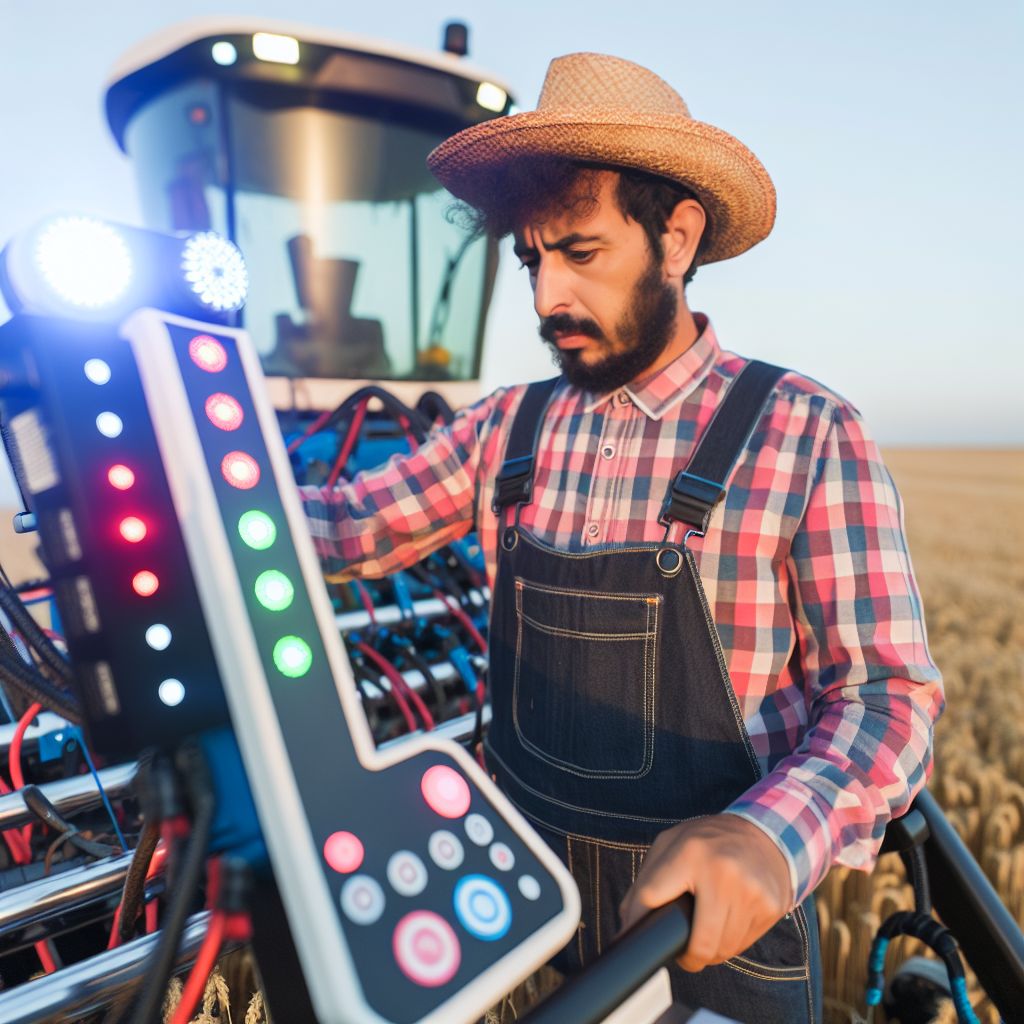
Future Trends in Autonomous Machinery for Agriculture
Integration of AI and Machine Learning
Farmers increasingly embrace artificial intelligence (AI) in autonomous machinery.
This integration enhances decision-making processes on the farm.
Additionally, machine learning allows equipment to adapt over time.
It analyzes data from past harvests to improve future crop yields.
Consequently, farmers gain precise insights for optimizing their operations.
Advancements in Drone Technology
Drones are revolutionizing agricultural monitoring practices.
Showcase Your Farming Business
Publish your professional farming services profile on our blog for a one-time fee of $200 and reach a dedicated audience of farmers and agribusiness owners.
Publish Your ProfileThey provide real-time aerial imagery and crucial data analysis.
Farmers can utilize drones for crop surveillance and health assessments.
Moreover, they enhance efficiency in applying pesticides and fertilizers.
This technology significantly reduces labor costs while increasing accuracy.
Increased Use of Autonomous Tractors
Autonomous tractors represent a major trend in agricultural machinery.
These machines operate without human intervention, increasing productivity.
Farmers can schedule work at any time, even during off-hours.
This flexibility allows for better use of favorable weather conditions.
Additionally, these tractors can precisely execute planting and tilling tasks.
Enhanced Connectivity Through IoT
The Internet of Things (IoT) enables seamless communication between machines.
Connected devices share real-time data with farmers, improving decision-making.
Farmers can monitor equipment performance and soil conditions remotely.
This connectivity leads to timely interventions and better resource management.
As a result, farms become more efficient and sustainable environments.
Focus on Sustainability
Sustainability is fundamental in the development of autonomous machinery.
The industry prioritizes eco-friendly designs and practices.
New machinery often focuses on reducing emissions and conserving resources.
For example, electric and hybrid farming equipment is gaining popularity.
Such practices lead to a healthier planet and sustainable agricultural practices.
Explore Further: Precision Agriculture Software Optimizing Sustainable Farm Management
The Role of Data and AI in Autonomous Farming Solutions
Introduction to Autonomous Farming
Autonomous farming utilizes advanced technologies to enhance agricultural processes.
This approach incorporates automation and data-driven strategies.
Importance of Data in Farming
Data plays a crucial role in optimizing agricultural operations.
Farmers collect data from various sources, including soil sensors and weather stations.
Analyzing this data helps in making informed decisions.
Types of Data Collected
- Soil composition and moisture levels
- Weather patterns and forecasts
- Pest and disease monitoring
- Crop health assessments
Data Processing and Analysis
Data processing involves turning raw information into usable insights.
AI algorithms analyze trends and patterns effectively.
This analysis enables predictive modeling in farming.
Artificial Intelligence in Farming
Artificial intelligence enhances farming practices significantly.
AI applications assist in crop management and resource allocation.
Machine Learning Applications
Machine learning algorithms improve crop yield predictions.
This technology helps farmers respond to changing conditions proactively.
Automation of Agricultural Tasks
AI-powered machinery automates tasks like planting and harvesting.
These machines operate efficiently, reducing the need for manual labor.
Benefits of Data and AI Integration
Integrating data and AI offers numerous advantages for farmers.
It increases efficiency and reduces operational costs.
Moreover, farmers achieve higher consistency in crop production.
Enhancing Sustainability
A data-driven approach promotes sustainable farming practices.
Farmers can minimize waste and optimize resource use.
Improving Decision-Making
Data insights lead to better strategic planning in agriculture.
Showcase Your Farming Business
Publish your professional farming services profile on our blog for a one-time fee of $200 and reach a dedicated audience of farmers and agribusiness owners.
Publish Your ProfileThis approach fosters proactive measures against potential risks.
Future of Autonomous Farming
The future of autonomous farming looks promising with ongoing technological advancements.
As data collection methods improve, farmers gain richer insights.
AI developments will continue to enhance agricultural productivity.
Environmental Impact of Autonomous Machinery on Modern Farming Practices
Reducing Soil Compaction
Autonomous machinery minimizes soil compaction effectively.
This reduction enhances root growth and health.
Healthier roots contribute to improved yields.
Farmers like Emily Carter extensively utilize lightweight equipment.
As a result, they improve soil structure and aeration.
Conserving Water Resources
Advanced technology in autonomous systems optimizes water usage.
These systems use precise irrigation techniques automatically.
Consequently, farmers save substantial amounts of water.
For instance, James Ford’s orchard has seen a 30% decrease in water consumption.
This efficiency protects local water supplies from depletion.
Reducing Chemical Usage
Autonomous machinery allows targeted chemical application.
Farmers can focus on areas needing treatments specifically.
This method reduces overall pesticide and herbicide usage.
As a result, the environment sees less chemical runoff.
Companies like GreenTech Solutions lead in developing such technologies.
Enhancing Biodiversity
Implementing autonomous systems can protect native species.
These systems often reduce the need for harmful herbicides.
Moreover, they promote diverse agricultural landscapes.
Farmers who prioritize biodiversity see resilient ecosystems.
This approach also invites beneficial insects back to farms.
Implementing Sustainable Practices
Sustainability becomes more attainable through autonomous machinery.
Farmers utilize data analytics for better crop management.
This creates a positive feedback loop for sustainable land use.
Moreover, companies are designing machines with renewable energy sources.
Hence, the reliance on fossil fuels diminishes over time.
Additional Resources
Autonomous Farm Equipment Market Size, Growth, Report, By 2033

